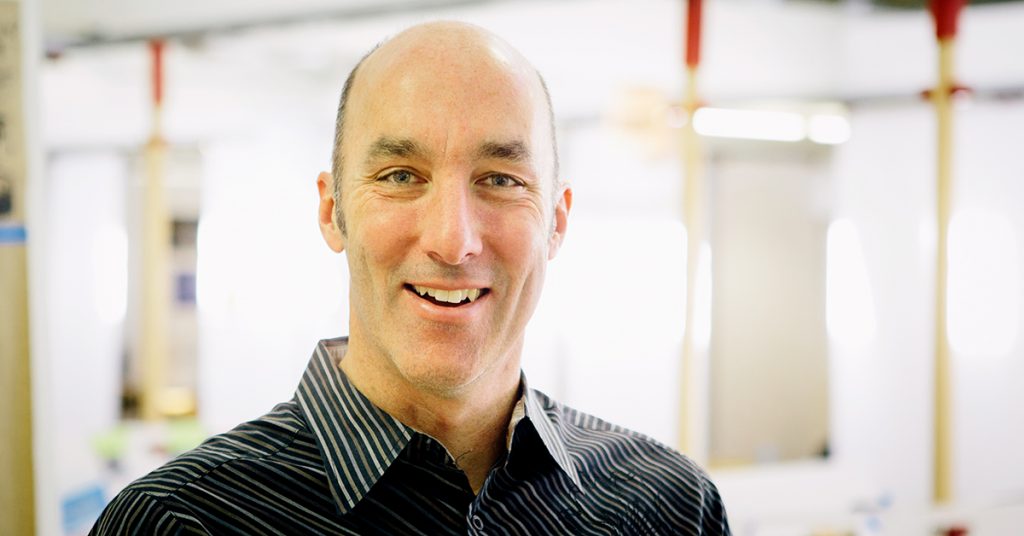 Buckle up and prepare to look at things a bit differently — apostle for creativity and advocate for innovators George Kembel returns to Chautauqua Institution at 10:45 a.m. Thursday in the Amphitheater, bringing with him a renewed message of inspiring latent innovation in everyone.
Buckle up and prepare to look at things a bit differently — apostle for creativity and advocate for innovators George Kembel returns to Chautauqua Institution at 10:45 a.m. Thursday in the Amphitheater, bringing with him a renewed message of inspiring latent innovation in everyone.
Kembel is no stranger to Chautauqua. After speaking here in 2009, he returned two years later, bringing with him his family. His wife and three boys, now aged 8, 10 and 12, accompany him again this week.
“I wouldn’t want them to miss this wonderful experience on the grounds,” he said. “This is such a special, unique place.”
After a successful career with startups and entrepreneurship in Silicon Valley spanning two decades, Kembel, an alumnus of Stanford University, returned to his alma mater to launch a program that eventually became the d.school. The school places a higher value on learning than on expertise, experimentation over planning and collaboration over individual excellence, according to its website.
Kembel described the d.school as “more of a crossroads than a silo.” He said its emphasis on personal growth and practical labs over lectures has set it apart from Stanford’s more traditional departments. The “d” could mean design, but that isn’t particularly important to its co-founder.
“It could stand for ‘different,’ ” he said. “There is a strong interdisciplinary character to the school.”
In his childhood, Kembel moved frequently with his family.
“Being a twin with my brother meant several important things to me,” Kembel said. “I was always linked to someone in my endeavors. Often, it has been my brother, who is also an entrepreneur. As we looked to create what became the d.school, it was my former professor who was my collaborator.”
Being a twin also meant a constant search for what was truly within him, Kembel said: his own unique, individual essence.
“I have learned to listen to my inner self, especially at times of change and transition in my life,” Kembel said. “I watch for signals and signs that I may be ready for something new.”
Being a father to three sons has offered its own challenges and opportunities for Kembel.
“As we watch them grow, my wife and I witness how the boys see things so differently than do adults,” he said. “We have a goal to align ourselves to who they really are as they develop. We can learn so much from children.”
Kembel recalled a sabbatical he took via a nautical semester at sea, traveling around the world with his family, students and fellow faculty members.
“I watched as my boys reacted on a bus trip in Ghana, looking out the windows at shanties lining the road,” he said. “ ‘It’s amazing,’ one of them said. ‘Look how these people have managed to build places to live out of trash.’ ”
Kembel moved his family three years ago from Silicon Valley to Boulder, Colorado, sensing that he would find there a “more life-growing place for all of us.” His wife, a speech therapist, has just completed a memoir of her life with Kembel and her three sons.
“I call cities like Boulder ‘global ecosystems,’ by which I mean places inhabited by innovators,” Kembel said. “In Boulder, we found creativity and new thinking in areas such as biotechnology, food and atmospheric research. Based partly on the presence of the University of Colorado in Boulder, the area has become a research hub. And it is a place of wellness. And – the Rocky Mountains are in our backyard.”
Kembel sees forces of innovation and creativity moving beyond centers such as Silicon Valley to global ecosystems. In addition to Boulder, he named Berlin, Beijing and Shanghai as emerging examples of new incubators of innovators.
Along the way, as Kembel forged an entrepreneurial career involving a succession of startups, he began to realize why investors decided to believe in him.
“I think they saw in me three things: A capacity to learn, empathy, and, in some cases, how I revealed myself in failure,” he said. “We formed our second startup when I was 27 years old. It lost $17 million. I had to lay off friends and trusted associates. What happened afterward? One of the biggest investors offered me a job in his company.”
Kembel has done his share of corporate consulting and offered some views on Google, a company he admires for its dedication to creating a workplace where innovators are nourished.
“I do think Google needs to watch that they don’t succumb to their scale,” he said. “Firms in general need to avoid placing too much value on economic growth at the cost of other things, like project-based learning.”
Kembel recalled, as an illustration of his approach, an exercise involving many senior frequent-flyer corporate executives. They had traveled so much for work that airports had essentially become invisible to them.
“As soon as they arrived on campus, we got them right back to the airport,” he said. “Their challenge was to completely redesign that airport. They learned that the most experienced are often the most blind.”
President Michael E. Hill has identified two Institution priorities: attracting more younger people to the grounds and improving relationships with the county outside the gates. Kembel said the Institution should look at “central challenges in the realm of thought and ideas.”
“I believe millennials want to have an impact and want to see that impact,” Kembel said. “The various arts and literary disciplines represented on the grounds could become secondary to intergenerational focus and collaboration.”
To improve “town-gown relations,” Kembel suggests placing a focus on empathy and face-to-face meetings.
“There is common ground,” he said. “It’s important to find it.”




